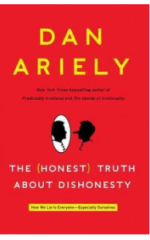The LiveTrue book collection is all about what it means to live true to self, others and our world. This book comes at this theme from the opposite direction; it delves into why it is we can be “untrue.” In The (Honest) Truth About Dishonesty: How We Lie to Everyone Especially Ourselves, author of Predictably Irrational Dan Ariely takes a provocative and thorough look at when and why people are dishonest.
He takes us into the forces that shape dishonesty, including which ones increase dishonesty, which ones do not, and which have no effect. I went in thinking I knew some of the factors in each of these categories but was I surprised! I bet you will be too. As Ariely says, “There are rational forces that we think drive our dishonest behavior-but don’t. And there are irrational forces that we think don’t drive our dishonest behavior-but do.”
In this book we learn how pervasive dishonesty is, and why it is so hard to see it in ourselves. In engaging layman’s terms, he makes his points through describing a slew of interesting experiments and studies th
at look at the psychological, environmental and social forces that can increase and decrease dishonesty in our daily lives.
Ariely delves into the rational, economic, and psychological motivations that lead us to choose to cheat for our own benefit while maintaining a positive view of ourselves.
He gives answers to questions like these:
How is our sense of morality connected to dishonesty?
How does the “fudge factor theory,” help explain how we rationalize cheating?
What are the links between creativity and dishonesty?
Why should you be careful if your friend or someone you are dating wears counterfeit products?
What is the “what the hell effect” when it comes to cheating?
In what kinds of situations is cheating most infectious?
What are cultural differences in dishonesty?
How crucial is others’ behavior in defining boundaries for our own behavior when it comes to dishonest or cheating behavior?
What are the real motives behind different kinds of self-deception, such as loving to exaggerate, fudging on resumes, our personal histories, or in sports (e.g., lying about steroid use)?
In this book, Ariely answers these questions and many more. In an engaging way, it examines how unethical behavior works in personal, professional and political worlds. Yes, lots to cover there! Readers take a deep look at “intricate relationship between honesty and dishonesty” and get quite the picture of what really causes dishonest behavior so people can more consciously choose different behaviors.
In the big picture, this book is about the betterment of societies; it is an excellent look at how people can curb dishonesty within and around themselves. Coming in the back door to ways to live your best life, this great nonfiction book is a must read for those interested in psychology and social science topics.


